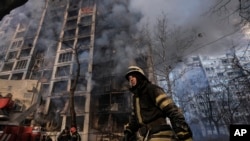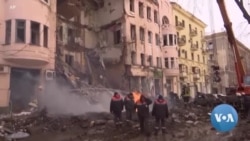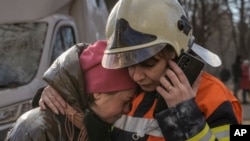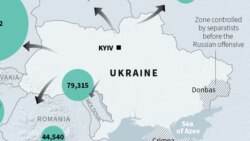Three European leaders headed to Kyiv on Tuesday as Russian forces bombarded the Ukrainian capital and other cities nearly three weeks into Russia’s invasion of its neighbor.
Russian shelling hit Kyiv early Tuesday, including one that struck an apartment building, killing four people and starting a fire that sparked a frenzied rescue effort, officials said. Kyiv Mayor Vitaly Klitschko announced a 35-hour curfew for the city beginning Tuesday night.
Czech Prime Minister Petr Fiala said he was traveling to Kyiv on Tuesday along with Polish Prime Minister Mateusz Morawiecki and Slovenian Prime Minister Janez Jansa to represent the European Council in a meeting with Ukraine’s President Volodymyr Zelenskyy and Prime Minister Denys Shmyhal.
“The purpose of the visit is to confirm the unequivocal support of the entire European Union for the sovereignty and independence of Ukraine,” Fiala said. “The aim of this visit is also to present a broad package of support for the Ukraine and Ukrainians.”
“In such critical times for the world it is our duty to be where history is forged,” Morawiecki wrote on Facebook. "Because it’s not about us, but about the future of our children who deserve to live in a world free from tyranny.”
The European Union announced a new round of sanctions against Russia that includes bans on transactions with certain state-owned companies or new investments in Russia’s energy sector, as well as tighter trade restrictions on iron, steel and luxury goods.
There are also sanctions targeting “key oligarchs, lobbyist and propagandists pushing the Kremlin’s narrative on the situation in Ukraine as well as key companies in the aviation, military and dual use, shipbuilding and machine building sectors.”
“This fourth package of sanctions is another major blow to the economic and logistic base upon which Russia relies on to carry out the invasion of Ukraine,” EU foreign policy chief Josep Borrell said in a statement Tuesday. “The aim of the sanctions is that President Putin stops this inhuman and senseless war.”
Much of the international response has been focused on punishing Russia through economic sanctions, and Japan also announced Tuesday new asset freezes for 17 Russians, including 11 members of the Russian parliament, billionaire Viktor Vekselberg and family members of banker Yuri Kovalchuk.
Negotiators from Russia and Ukraine were due to hold more talks Tuesday following a meeting Monday, held by video rather than in-person in neighboring Belarus like previous sessions, which yielded still no major signs of a breakthrough.
But Zelenskyy suggested a compromise on Tuesday, saying in a video message that Kyiv was ready to accept security guarantees that fall short of its goal to join NATO.
"If we cannot enter through open doors, then we must cooperate with the associations with which we can, which will help us, protect us ... and have separate guarantees," Zelenskyy said.
Kremlin spokesperson Dmitry Peskov said it was premature to predict whether the peace talks will lead to progress.
"The work is difficult, and in the current situation, the very fact that (the talks) are continuing is probably positive," Peskov said.
White House press secretary Jen Psaki told reporters the United States supports the negotiations, but that it is looking for signs that Russia is willing to pair talks with a pullback in violence.
“Our view continues to be that, despite words that are said in these talks or coming out of these talks, diplomacy requires engaging in good faith to de-escalate,” Psaki said Monday. “And what we’re really looking for is evidence of that. And we’re not seeing any evidence, at this point, that President Putin is doing anything to stop the onslaught or de-escalate.”
Psaki also declined to confirm a report that U.S. President Joe Biden is expected to travel to Brussels next week to meet with NATO leaders to discuss the conflict. She said the Biden administration is “closely engaged” with NATO and European allies about further diplomatic steps, including humanitarian and security assistance, but that no final decision about a Brussels trip has been made.
Biden is scheduled to sign an appropriations package Tuesday that includes $13.6 billion for emergency military and humanitarian aid for Ukraine. That will be followed Wednesday by an address to Congress by Ukrainian President Volodymyr Zelenskyy, who has appealed for international help including a no-fly zone over Ukraine that the Biden administration has ruled out.
Ukrainian Deputy Prime Minister Iryna Vereshchuk said the government hoped to be able to open nine humanitarian corridors Tuesday to evacuate civilians and deliver aid to those in areas besieged by Russian forces, including the southern city of Mariupol where Russian shelling prevented deliveries on Monday.
In a rare positive development Monday, Ukrainian officials in Mariupol said a convoy of civilian cars was able to leave after many previous attempts to evacuate civilians collapsed. Officials said Monday that 160 cars left in the first two hours that the corridor was open. On Tuesday, the city council said 2,000 civilian cars had left, but it was not immediately clear if the 160 cars that left on Monday were included in the tally.
Also Tuesday, Ukraine's parliament voted to extend martial law for another month until April 24, barring men between 18 and 60 from leaving the country so they can be called to join the military.
The United Nations said Tuesday the number of people who have fled Ukraine since the invasion began had reached 3 million.
Kremlin spokesman Dmitry Peskov told reporters Tuesday that the actions of a woman who interrupted state television’s Channel One evening news broadcast in Moscow with an anti-war poster amounted to “hooliganism.”
The poster said “No War” in English, and underneath those words, “Stop the war. Don’t believe the propaganda. Here they are lying to you,” in Russian.
The poster was signed in English, “Russians against the war.”
Eastern European chief Myroslava Gongadze, White House correspondent Anita Powell, senior diplomatic correspondent Cindy Saine, national security correspondent Jeff Seldin, U.N. correspondent Margaret Besheer, State Department Bureau Chief Nike Ching, and Mandarin Service reporters Lin Yang and Si Yang contributed to this report.
Some information also came from The Associated Press, Agence France-Presse and Reuters.










